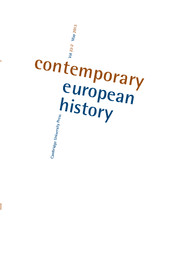
Contemporary European History
Scope & Guideline
Exploring the Threads of Modern European Narratives
Introduction
Aims and Scopes
- Interdisciplinary Historical Narratives:
The journal focuses on integrating various disciplines such as sociology, politics, and economics into historical narratives, allowing for a richer understanding of European history. - Post-Colonial Studies:
There is a significant emphasis on post-colonial perspectives, exploring how colonial legacies shape contemporary European societies and histories. - Transnational and Comparative Approaches:
The journal encourages comparative studies across different European contexts, highlighting transnational influences and interactions throughout history. - Socio-Political Movements and Activism:
Research often delves into the dynamics of social movements, political activism, and their implications for democracy and governance in Europe. - Cultural History and Memory Studies:
The exploration of cultural artifacts, public memory, and historical narratives is a core area, examining how memory shapes identity and society in Europe. - Gender and Social History:
A focus on gender dynamics and social history is prevalent, analyzing the roles and representations of different genders in shaping European history.
Trending and Emerging
- Migration and Refugee Studies:
Increasingly, research focuses on migration patterns and the experiences of refugees, reflecting contemporary challenges in Europe and the historical context of such movements. - Environmental and Climate History:
Emerging scholarship on environmental history is gaining traction, examining the interplay between European history and ecological changes, particularly in the context of climate change. - Digital Humanities and History:
The integration of digital methods in historical research is on the rise, allowing for innovative analyses and broader accessibility to historical data. - Globalization and Transnationalism:
There is a burgeoning interest in globalization and its effects on European societies, emphasizing interconnectedness and the influence of global forces on local histories. - Human Rights and Social Justice:
Themes surrounding human rights, social justice, and their historical evolution are becoming increasingly prominent, reflecting current societal movements and concerns. - Cultural Memory and Identity Politics:
Research focusing on cultural memory, identity politics, and their historical roots is emerging, as scholars explore how past events shape contemporary identities and societal conflicts.
Declining or Waning
- Traditional National Histories:
There is a noticeable decline in the publication of traditional national histories that focus solely on individual nations without considering broader transnational contexts. - Militaristic and War-Centric Narratives:
Themes centered around militaristic perspectives and the glorification of warfare are becoming less frequent, as the journal shifts towards more nuanced explorations of peace, reconciliation, and social dynamics. - Eurocentric Perspectives:
The journal is increasingly moving away from Eurocentric narratives, focusing instead on global interactions and the impact of non-European entities on European history. - Static Historical Accounts:
There is a waning interest in static historical accounts that do not engage with contemporary issues; the journal favors dynamic interpretations that connect past events to current socio-political contexts.
Similar Journals
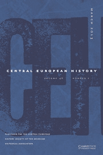
CENTRAL EUROPEAN HISTORY
Uncovering the Complexities of Central European HistoryCENTRAL EUROPEAN HISTORY is a distinguished academic journal published by Cambridge University Press, dedicated to the exploration and analysis of historical developments in Central Europe. With its ISSN 0008-9389 and E-ISSN 1569-1616, this journal has been a cornerstone in historical scholarship since its inception in 1968, catering to a global audience through its rigorous research articles and interdisciplinary approach. Recognized in the Q2 category in History in 2023, it aims to bridge gaps in Central European historiography and foster a deeper understanding of the region's complex past. The journal's commitment to publishing high-quality research makes it an invaluable resource for historians, researchers, and students alike. Although it does not offer Open Access, CENTRAL EUROPEAN HISTORY remains a vital publication in the field, addressing themes and debates that resonate with contemporary academic discourses. With a rich archive spanning over five decades, it continues to influence scholarship and promote informed discussions around Central European historical narratives.

Ricerche di Storia Politica
Unveiling the Intersections of Politics and HistoryRicerche di Storia Politica is an esteemed academic journal published by SOC ED IL MULINO, dedicated to advancing the understanding of political history through rigorous research and scholarship. Since its inception in 1999, this Italian journal has positioned itself as a valuable resource for historians, political scientists, and scholars interested in the intersection of political developments and historical contexts. Despite its challenging rankings in the Scopus database, being placed in Q3 and Q4 quartiles for history and political science respectively, the journal contributes significantly to the ongoing discourse in these fields, highlighting innovative interpretations and diverse perspectives. While not currently an open-access publication, Ricerche di Storia Politica offers in-depth analyses that are essential for anyone seeking to understand complex political narratives and their historical underpinnings, making it an important addition to academic libraries and research collections worldwide.
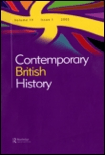
Contemporary British History
Connecting Past Events to Present RealitiesWelcome to Contemporary British History, the premier journal dedicated to the analysis and discussion of modern historiographical debates in the context of the United Kingdom. Published by Routledge Journals, Taylor & Francis Ltd, this journal holds significant prestige, recognized for its contributions to fields such as Cultural Studies, Development, History, Political Science, and Safety Research. As illustrated by its 2023 Quartile Rankings, it stands in the upper tiers among influential research publications, with a Q1 ranking in History. Following its converged years from 2001 to 2024, Contemporary British History has established itself as an essential resource for researchers, educators, and practitioners aiming to deepen their understanding of historical contexts and their implications for contemporary society. While the journal is not open access, it offers robust access options through academic institutions and libraries, supporting its mission to foster rigorous scholarly dialogue.
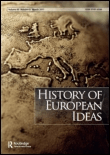
HISTORY OF EUROPEAN IDEAS
Illuminating the Intersections of History and IdeasHISTORY OF EUROPEAN IDEAS, published by Routledge Journals, Taylor & Francis Ltd, stands as a premier platform for the exploration and dissemination of scholarly research within the fields of history, philosophy, sociology, and political science. With an ISSN of 0191-6599 and E-ISSN of 1873-541X, the journal has established itself in the academic community as a Q1 journal in both History and Philosophy and Q2 in Sociology and Political Science as of 2023. Its rigorous publication standards contribute to its notable Scopus rankings, reinforcing its importance in the humanities and social sciences. Spanning from 1980 to 2024, the journal invites contributions that delve into the intricate interrelations of European ideas and their historical contexts, thus aiming to enrich academic discourse and advance knowledge in these disciplines. Although not available as Open Access, the journal’s curated content remains pivotal for researchers, professionals, and students seeking in-depth analyses and innovative perspectives on European thought.
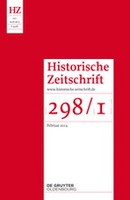
Historische Zeitschrift
Cultivating a Rich Legacy of Historical InquiryHistorische Zeitschrift is a prestigious academic journal dedicated to the field of history, published by WALTER DE GRUYTER GMBH. Established in 1859, the journal has a long-standing legacy of promoting scholarly discourse and research that spans pivotal eras from the 19th century to contemporary times. With an ISSN of 0018-2613 and an E-ISSN of 2196-680X, it is well-recognized in the academic community for its rigorous standards and contributions to historical scholarship. This journal is currently positioned in Quartile 3 of its category for 2023 and holds a respectable rank of #762 out of 1760 in Scopus, placing it in the 56th percentile for Arts and Humanities – History. Though not available in an open access format, Historische Zeitschrift continues to attract submissions from both emerging and established historians eager to contribute to an understanding of historical contexts and narratives. Its scope includes extensive historical analysis, discussions on methodology, and explorations of sources, making it an invaluable resource for researchers, professionals, and students alike who seek to deepen their insights into historical developments.

STUDI STORICI
Advancing Historical Scholarship Since 1966STUDI STORICI, published by CAROCCI EDITORE SPA, is a distinguished journal in the field of History, recognized for its contributions to historical scholarship since its inception in 1966. With an ISSN of 0039-3037 and an E-ISSN of 2036-458X, this journal is acclaimed for delving into various historical themes and methodologies, making notable influences in both academic research and public discourse. It holds a commendable Q2 ranking in the 2023 Scopus category for History, placing it in the top tier of historical research journals. The journal’s curated articles span a wide range of historical periods and contexts, providing critical insights and fostering scholarly dialogue among researchers, professionals, and students alike. Despite not being open access, STUDI STORICI remains an essential resource for anyone seeking to engage with the complexities of history and its implications in contemporary society. Based in Rome, Italy, at VIA SARDEGNA 50, 00187, it continues to uphold a rich legacy of excellence instrumental in shaping the field.
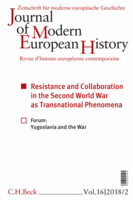
Journal of Modern European History
Fostering Scholarly Exchange on European DevelopmentsThe Journal of Modern European History, published by SAGE PUBLICATIONS LTD, is an essential resource for scholars and practitioners in the field of history, particularly focusing on modern European developments. With an ISSN of 1611-8944 and E-ISSN of 2631-9764, this journal boasts a reputation as a Q2 journal in the Arts and Humanities - History category, ranking in the top 25% of its field with a Scopus rank of #404 out of 1760 publications. With its converged years spanning from 2010 to 2024, this journal aims to provide cutting-edge research articles that deepen the understanding of modern European historical events, themes, and methodologies. As a pivotal platform for scholarly discourse, it supports vibrant academic exchange while offering avenues for researchers, professionals, and students to engage with innovative thought in the history domain. For those seeking to expand their knowledge or contribute to the field, the Journal of Modern European History serves as a vital tool for both insight and inspiration.

HISTORISCHES JAHRBUCH
Advancing Scholarly Dialogue in History.HISTORISCHES JAHRBUCH is a notable German academic journal published by VERLAG KARL ALBER, dedicated to the field of history. With a rich tradition that began in 1941, this journal serves as a platform for scholarly research, exploring various historical themes and methodologies. Although specific impact factors are not readily available, its categorization as Q4 in History indicates its role in the wider academic discourse. HISTORISCHES JAHRBUCH is primarily accessible through subscription, reflecting its commitment to traditional publishing while providing valuable insights for historians, researchers, and students. The journal's coverage, which has converged over selected years including 1980, discontinuing in Scopus, highlights its shifting focus and the evolving landscape of historical study. As a contributing member to the historical scholarship community, HISTORISCHES JAHRBUCH continues to enrich the understanding of historical narratives and foster academic exploration.

Historia-Santiago
Engaging with Diverse Perspectives on Historical ContextsHistoria-Santiago is an esteemed academic journal published by the Pontificia Universidad Católica de Chile, Instituto de Historia. Since its inception in 2000, the journal has embraced an Open Access model, facilitating broad dissemination of historical research and ensuring that critical scholarly work is freely accessible to researchers, professionals, and students around the globe. With a focus on Latin American history, Historia-Santiago provides a platform for innovative research and contributions that engage with diverse historical narratives and methodologies. The journal aims to foster interdisciplinary dialogue and stimulate scholarly debate, thereby enriching the understanding of historical contexts and their implications in contemporary society. By maintaining high academic standards, Historia-Santiago occupies a vital role in the field of historical studies, encouraging authors to explore new ideas and perspectives that shape the understanding of our past.

ZEITGESCHICHTE
Decoding Contemporary Issues Through a Historical LensZEITGESCHICHTE, published by VANDENHOECK & RUPRECHT GMBH & CO KG, is a leading academic journal in the fields of Cultural Studies and History, distinguished by its Q2 ranking within the respective categories as of 2023. Based in Austria and serving a global audience, ZEITGESCHICHTE encompasses a broad range of interdisciplinary scholarly articles that examine historical context and cultural dynamics from various perspectives, contributing to a deeper understanding of contemporary issues rooted in the past. With a publication history dating back to 1976, the journal has evolved significantly, currently offering vital insights from 2006 to 2023, although it is not an open-access platform, ensuring that each piece maintains rigorous peer-review standards. This esteemed journal serves as an essential resource for researchers, students, and professionals seeking to navigate the intricate intersections of history and culture, reinforcing its importance in academic discourse.